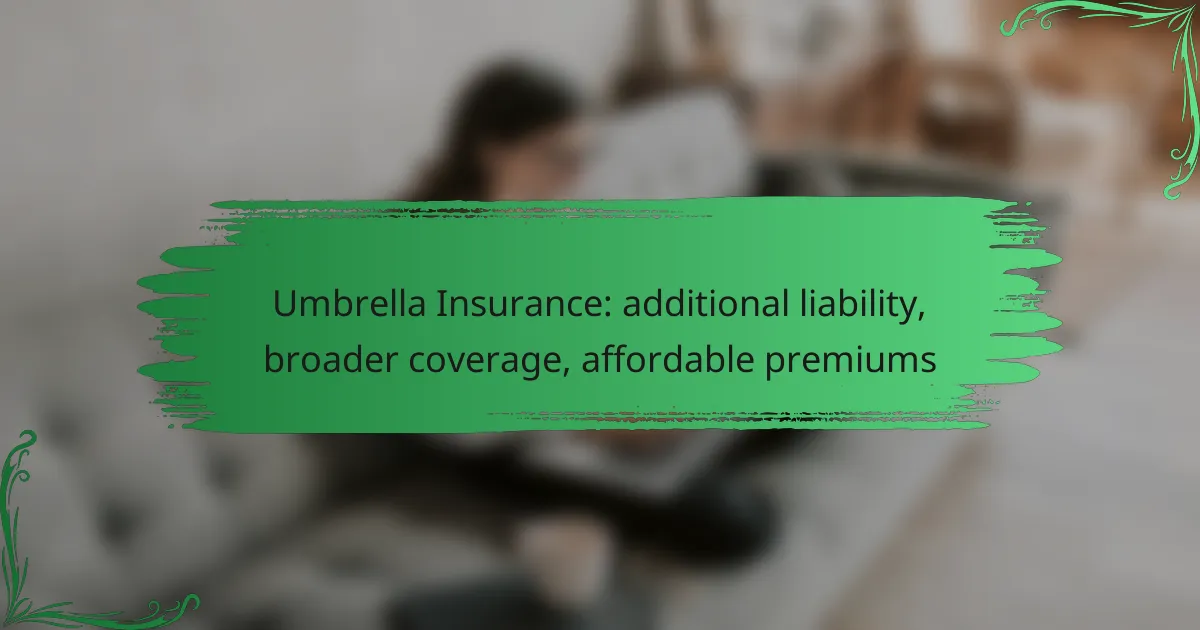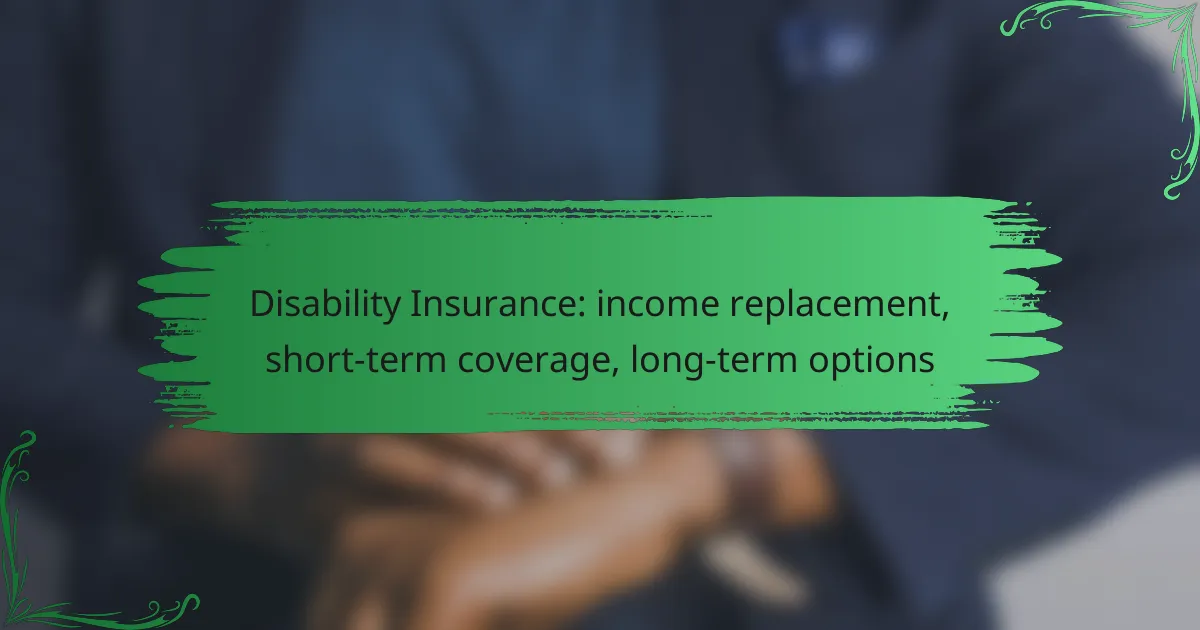Umbrella insurance offers an extra layer of liability coverage that extends beyond standard home and auto policies, providing broader protection against potential lawsuits. This affordable insurance option is designed to safeguard your assets and future earnings from significant legal expenses or damages, making it a wise choice for individuals and families seeking enhanced financial security.

What is umbrella insurance?
Umbrella insurance provides additional liability coverage beyond standard policies, offering broader protection against claims. It is designed to safeguard your assets and future earnings from significant legal expenses or damages.
Definition of umbrella insurance
Umbrella insurance is a type of liability insurance that extends your coverage limits on existing policies, such as homeowners or auto insurance. It kicks in when your standard coverage is exhausted, protecting you from large claims or lawsuits.
This insurance typically covers various liabilities, including personal injury, property damage, and certain lawsuits, making it a critical component of a comprehensive risk management strategy.
How it differs from standard liability insurance
Standard liability insurance provides coverage up to a specific limit, which may not be sufficient in severe cases. In contrast, umbrella insurance offers higher limits, often starting at one million USD, and covers additional risks not included in standard policies.
For example, if you cause an accident that results in significant medical bills exceeding your auto insurance limit, umbrella insurance can cover the remaining costs. This additional layer of protection is particularly valuable for individuals with substantial assets or income to protect.

What are the benefits of umbrella insurance in the UK?
Umbrella insurance in the UK provides additional liability coverage beyond standard home and auto policies, offering broader protection against potential lawsuits. This type of insurance is often affordable and can safeguard your assets against significant financial loss.
Additional liability coverage
Umbrella insurance extends your liability coverage limits, typically starting at £1 million and going up from there. This means that if you face a lawsuit for damages exceeding your primary policy limits, your umbrella policy can cover the excess costs.
For example, if a guest is injured on your property and the damages total £500,000, but your home insurance only covers £250,000, your umbrella policy can cover the remaining £250,000. This additional layer of protection is crucial for individuals with substantial assets to protect.
Broader protection against lawsuits
Umbrella insurance not only increases your liability limits but also covers a wider range of incidents that may not be included in standard policies. This can include defamation, false arrest, and other personal liability claims.
Consider a scenario where you are involved in a car accident that results in significant damages and injuries. If the claims exceed your auto insurance limits, your umbrella policy can step in to cover those additional costs, providing peace of mind and financial security.

How much does umbrella insurance cost in the UK?
Umbrella insurance in the UK typically costs between £50 and £300 annually, depending on various factors. This additional liability coverage offers broader protection beyond standard policies, making it a valuable option for many individuals and families.
Average premium ranges
The average premium for umbrella insurance in the UK generally falls within the range of £100 to £200 per year. However, some policies may be available for as low as £50, while others could reach up to £300 or more, depending on the coverage limits and the insured’s risk profile.
For instance, a policy with a £1 million coverage limit might cost around £150 annually, while higher limits, such as £5 million, could increase the premium significantly. It’s essential to compare quotes from different insurers to find the best deal.
Factors affecting pricing
For example, individuals with multiple properties or high-value assets may face higher premiums due to increased liability risks. Additionally, a clean claims history can lead to lower rates, while a history of frequent claims may result in higher costs.

Who needs umbrella insurance in the UK?
Umbrella insurance in the UK is essential for individuals who want to protect their assets from significant liability claims. It provides additional coverage beyond standard policies, making it suitable for those with considerable wealth or assets at risk.
High-net-worth individuals
High-net-worth individuals often face unique risks due to their substantial assets. Umbrella insurance can safeguard against large claims that exceed the limits of standard liability policies, such as those arising from accidents or lawsuits. For instance, if a guest is injured on their property, the costs could quickly escalate beyond typical home insurance coverage.
It is advisable for these individuals to assess their total net worth and consider an umbrella policy that provides coverage in the low millions to ensure adequate protection. Consulting with an insurance advisor can help determine the appropriate amount of coverage based on personal circumstances.
Homeowners with significant assets
Homeowners with significant assets should consider umbrella insurance to protect their investments from unforeseen liabilities. This type of insurance can cover legal fees, medical expenses, and damages that may arise from incidents on their property or due to their actions. For example, if a tree falls on a neighbor’s car, the homeowner could be liable for repairs that exceed their home insurance limits.
To decide on the right umbrella policy, homeowners should evaluate their assets, including property, savings, and investments. A common recommendation is to secure coverage that is at least equal to the total value of these assets, providing a safety net against potential lawsuits and claims.

What does umbrella insurance cover?
Umbrella insurance provides additional liability coverage beyond the limits of your standard policies, offering broader protection against various claims. It typically covers personal liability and property damage, making it a valuable option for those seeking to safeguard their assets against unexpected events.
Personal liability coverage
Personal liability coverage under an umbrella policy protects you from claims resulting from bodily injury or property damage that you may cause to others. This can include incidents like accidents at your home or injuries caused by your pets. Coverage limits can often range from one million to several million dollars, depending on your needs and the policy you choose.
When considering personal liability coverage, assess your risk factors, such as your lifestyle and assets. Higher coverage limits can provide peace of mind, especially if you have significant assets to protect. Be aware of exclusions, such as intentional acts or business-related incidents, which may not be covered.
Coverage for property damage
Coverage for property damage in an umbrella policy extends to damages you may cause to someone else’s property, whether through accidents or negligence. This can include damage to vehicles, homes, or other personal property. Like personal liability, property damage coverage typically starts at one million dollars and can go higher based on your policy.
To effectively utilize this coverage, understand the specific situations that may lead to claims. For example, if you accidentally damage a neighbor’s fence or cause a car accident, umbrella insurance can help cover the costs beyond your primary policy limits. Always review your existing home and auto insurance policies to ensure adequate primary coverage before relying on your umbrella policy.

What are the limitations of umbrella insurance?
Umbrella insurance provides additional liability coverage but has several limitations that policyholders should understand. It typically does not cover certain types of risks, and there are specific exclusions and policy limits that can affect the overall protection offered.
Exclusions to be aware of
Umbrella insurance policies often exclude coverage for specific situations, such as intentional acts, business-related liabilities, and certain types of personal injury claims. For example, if you are sued for defamation or if an incident occurs while operating a business, your umbrella policy may not provide coverage.
Additionally, many policies do not cover damages related to vehicles, as these are generally handled by auto insurance. It’s essential to review your policy details to understand what is and isn’t included, as exclusions can vary significantly between providers.
Policy limits and conditions
Umbrella insurance typically comes with a minimum coverage limit, often starting at around $1 million, but higher limits are available for those needing more protection. However, these policies also have conditions that must be met, such as maintaining underlying liability insurance, which is usually required to qualify for the umbrella coverage.
When choosing a policy, consider the potential risks you face and select a limit that adequately covers your assets. It’s wise to consult with an insurance agent to ensure your coverage aligns with your financial situation and personal needs.

How to choose the right umbrella insurance policy?
Choosing the right umbrella insurance policy involves evaluating your specific coverage needs and comparing different providers to find the best fit. Focus on your assets, potential liabilities, and the limits of your existing policies to determine the appropriate level of additional coverage.
Assessing your coverage needs
Start by identifying your assets, including your home, savings, and investments, as these are what umbrella insurance protects. Consider your lifestyle and activities that may increase liability risk, such as owning a pool or hosting frequent gatherings. A common rule of thumb is to have at least enough coverage to match your total net worth.
Evaluate your existing liability limits on homeowners and auto insurance policies. Umbrella insurance typically provides coverage starting at $1 million, but you may want to consider higher limits based on your financial situation and risk exposure. Think about future changes, like starting a business or acquiring new assets, which could necessitate additional coverage.
Comparing different providers
When comparing umbrella insurance providers, look for companies with strong financial ratings and positive customer reviews. Check the specific terms of coverage, including exclusions and conditions, as these can vary significantly between insurers. Pay attention to the premium costs, which can range from low hundreds to low thousands of dollars annually depending on coverage limits and personal risk factors.
Request quotes from multiple providers to gauge the price differences and coverage options. Some insurers may offer discounts if you bundle umbrella insurance with other policies, such as auto or home insurance. Be sure to read the fine print and understand the claims process, as a smooth experience can be crucial when you need to use your policy.

What are common misconceptions about umbrella insurance?
Many people misunderstand umbrella insurance, believing it is either unnecessary or too expensive. In reality, it provides essential additional liability coverage at an affordable cost, making it a valuable asset for many individuals and families.
Myths about affordability
A common myth is that umbrella insurance is prohibitively expensive. In fact, premiums typically range from a few hundred to a thousand dollars annually, depending on the coverage amount and individual risk factors. This cost is often minimal compared to the financial protection it offers.
Another misconception is that only wealthy individuals need umbrella insurance. However, anyone with assets to protect or potential liabilities, such as homeowners or those with significant savings, can benefit from this type of coverage. It is a cost-effective way to safeguard your financial future.
Misunderstandings regarding coverage scope
Many people think umbrella insurance only covers personal liability claims, but it actually extends to various situations, including lawsuits for defamation, false arrest, or other personal injury claims. This broader coverage can be crucial in protecting your assets.
Additionally, some believe that umbrella insurance replaces existing policies. In reality, it supplements your standard homeowners, auto, or renters insurance, kicking in when those limits are exhausted. Understanding this relationship is key to maximizing your protection.



